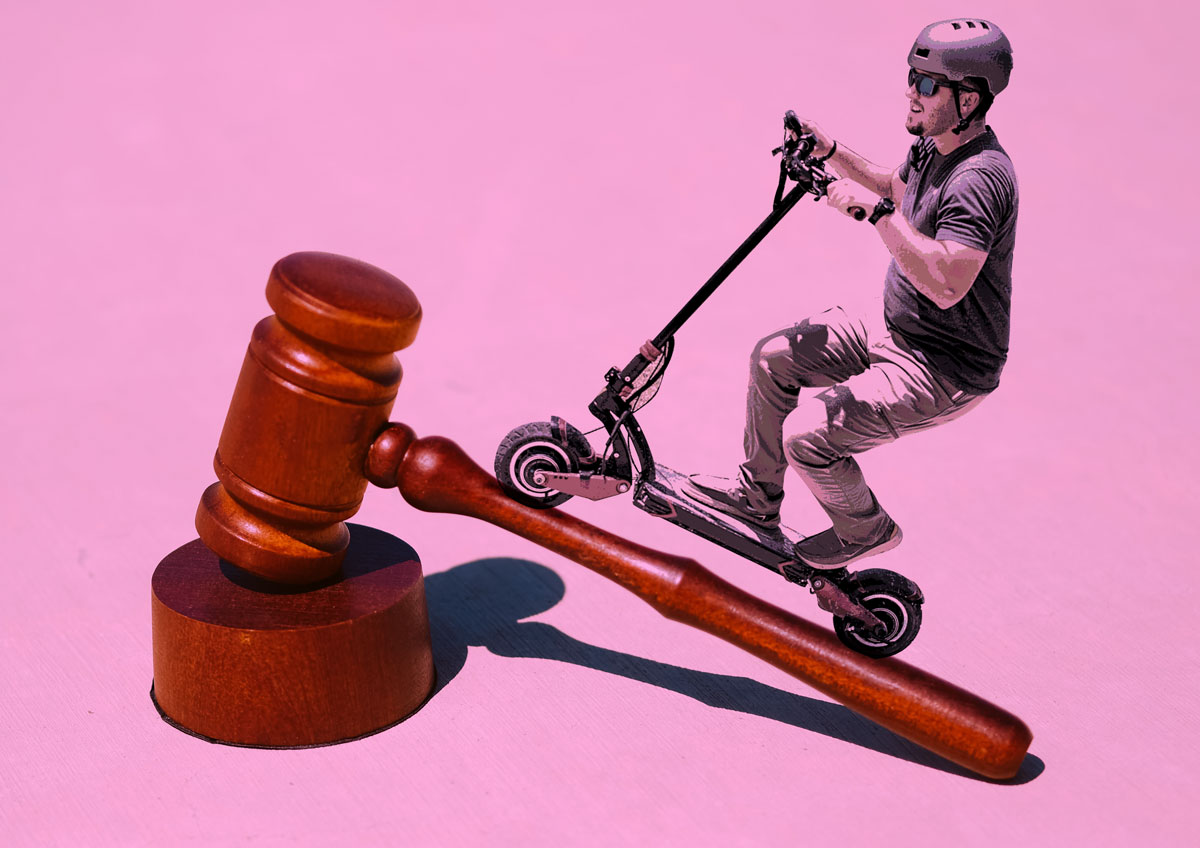With the Government currently looking into legalising the use of electric scooters on the public highway, what are the implications if an e-scooter is involved in an accident?
Forget vaccines, Brexit, or even religion – if there’s one topic you should never bring up in polite company it’s cyclists. They don’t pay Road Tax1. They jump red lights2. And what’s the point of those cycle lanes if they never use them?3 Let’s agree to disagree. There are plenty of people riding bikes and driving cars who shouldn’t be on the road. Under Common Law, every road user has a duty of care to other road users. The standard of care is that of the average ordinary skilful driver. If you aren’t looking out for other road users, judging their speed before pulling out in front of them, or are turning across them, then you are not exercising your duty of care. But what if the other road user is doing something wrong? If a motorist is speeding or a cyclist has no lights at night then does their disregard for the law mean you can’t be held responsible if you are in a collision with them? A recent case involving an e-scooter rider has opened this debate.
The electric scooter rider suffered serious injuries when he was hit by the mirror of an overtaking bus. His legal team claim that he was wearing a high visibility jacket and helmet and taking all reasonable precautions when the collision took place. It is believed that the defendant’s legal team are arguing that as the scooter was being ridden illegally on a public highway they shouldn’t pay out any compensation. Their defence is based on the legal principle of ex turpi causa.
In a nutshell, ex turpi causa is a legal doctrine that states a person cannot benefit from their crime. “The idea that the e-scooter rider not being entitled to anything are nonsense, in my view.” explains Robin Torr, Senior Partner at Pilgrim Hope Solicitors. “Take for example a person who is injured in a car accident and they were not wearing their seatbelt (which is illegal). They would be compensated albeit that their compensation will be reduced by 25% if they would not have been injured at all or 15% if the extent of the injury would have been lessened had the seatbelt been worn. The absence of the seatbelt leads to what is known as ‘contributory negligence’. You cannot be found to be 100% contributorily negligent. The 25%/15% deduction arises out of a case decided many moons ago (Froome v Butcher). In any case where contributory negligence is alleged it is for the party making the allegation (the Defendant) to prove the allegation. If they cannot do so, no reduction will be applied.”
From a lay person’s perspective it may appear that not wearing a seat belt, while being illegal, could easily be a case of absent mindedness. Surely this is different to someone who knowingly breaks the law? Even in the case of someone knowingly breaking the law, all road users still have a duty of care to other road users. This was tested in the case of McCracken (A protected party by his litigation friend) v Smith, MIB and others [2015] EWCA Civ 380.
McCracken was the pillion passenger on a stolen motorcycle that was being ridden dangerously on a cycle path. After suffering injuries when the stolen motorcycle was in a collision with a minibus, McCracken attempted to claim for his injuries. Lawyers for the rider of the stolen motorcycle and the driver of the minibus (the Defendants in the case) argued that McCracken was attempting to benefit from his own wrong doing (being a passenger on a motorcycle that he knew was stolen). In other words, they looked to invoke the ex turpi causa defence.
The Court of Appeal decided that the accident was caused by both the dangerous riding of the motorbike and the negligent driving of the minibus. In legal terms, the fact of the criminal conduct was one of the two causes was not sufficient basis for the ex turpi causa defence to succeed. McCracken’s claim was successful, albeit his compensation was reduced because of his failure to wear a helmet and to reflect his own responsibility for his injuries.
As Lord Justice Clarke said: “If the position were otherwise, any driver whose road traffic offence constituted turpitude, but who was only partially to blame, would fail to recover from anyone else whose negligence caused the accident”.
If you are involved in a road traffic collision it is vital that you speak to an experienced lawyer. All too often insurance companies will point the finger of blame at the person making a claim. To speak to our Personal Injury Team call 01257 422 500 8.00am to 9.00pm weekdays and 9.00am to 7.00pm on weekends.
1. Road Tax was abolished in 1937.
2. See here
3. See Section 63 of the Highway Code

